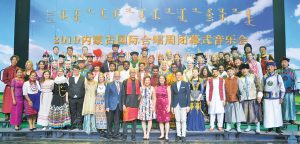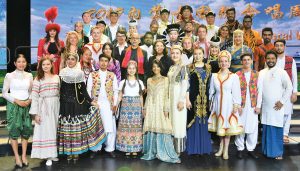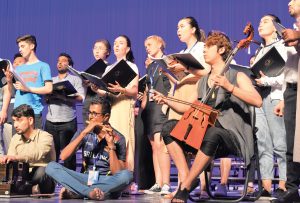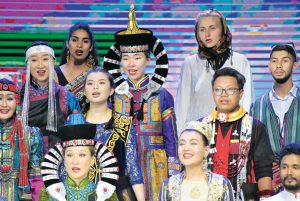Shanghai Cooperation Organisation Countries’ YOUTH CHOIR (SCOCYC), a project of the International Federation for Choral Music (IFCM)
Ki Adams, Chair of the SCOCYC Artistic Committee
IFCM, working together with the Shanghai Cooperation Organisation (SCO), organised the first SCO Countries’ Youth Choir (SCOCYC) in Hohhot, Inner Mongolia, China (24 June – 7 July 2019). This special project brought together 54 singers and instrumentalists (ages 19-35) for an outstanding educational, cultural and social experience. Performers were invited from the 18 countries comprising the SCO network, which include eight member states (China, India, Kazakhstan, Kyrgyzstan, Pakistan, Russia, Tajikistan, Uzbekistan), four observer states (Afghanistan, Belarus, Iran, Mongolia), and six dialogue partners (Armenia, Azerbaijan, Cambodia, Nepal, Sri Lanka, Turkey).
Not only did the singers represent the cultural diversity of the SCO countries: the selected repertoire also included works from 10 countries (Afghanistan, Belarus, China, India, Iran, Kazakhstan, Mongolia, Russia, Turkey, Uzbekistan) in 13 languages (Arabic, Belarussian, Dari, English, Farsi, Hindi, Kazakh, Mandarin, Mongolian, Russian, Turkish, Urdu, Uzbek).
The conductors for this inaugural SCO Countries’ Youth Choir were two internationally renowned choral musicians and instructors: André de Quadros (India-USA) and Maria Goundorina (Russia-Sweden). Coming from remarkably diverse choral traditions, André and Maria complemented each other seamlessly. The outcome of this partnership was equally thrilling and poignant, from the selection of repertoire to the improvisational explorations combining musical and cultural traditions and the innovative staging and presentation of the programme.

André de Quadros summarises the experience from his perspective:
SCOC Youth Choir was a profound experience for all of us. As a conductor and as one of the organisers, I was personally invested in participation from countries that are rarely represented, such as Afghanistan, Cambodia, Iran, Sri Lanka and other countries from Central Asia. One of the most profound experiences was to put together an instrumental ensemble that does not normally exist in choral music, with no instruments from the Western canon. We had players who had no common language other than music and who were playing without notated music. With singers and artists from nine Muslim and nine non-Muslim countries, this was an intercultural experience that was simultaneously ground-breaking and paradigm-shifting. What we experienced was so far outside the norms of choral music as to be uniquely life-changing.
Following a week of intense rehearsals, the SCO Countries’ Youth Choir performed at the SCO Countries’ Choral Festival in Hohhot. During the choral festival, the choir gave concerts in Hohhot and surrounding cities. The tour concluded with a concert in Beijing at the International Horticultural Exhibition 2019. Here are some of the highlights from this historic Eurasia choir project.

Different styles of singing together. All singers were exposed to many different ways of singing choral music and of singing together. Singers from some of the Russian-speaking countries, who came from a strong but often prescriptive choral tradition, had little knowledge of or experience with improvisation in choral singing. These singers learned how to use their voices, bodies and even the performance space in new ways. Singers from Southeast Asia, who have great musical traditions of solo singing but had never before sung in a choir, learnt how to read music, how to sing in harmony with others, and how to blend their voices to create unified/balanced tones, chords, harmonies and textures.
Diverse repertoire. Music was chosen from the rich traditions of the SCO countries… in 12 languages! There were no singers from Europe or the Americas and no repertoire from the Western classical choral canon. This was choral singing created by composers/singers in the SCO countries and performed by young people in the SCO countries. It was a truly historic project for the international choral community. Nothing like this, on such a large scale, has ever happened before in the choral world.
Instrumentalists. With the exception of the morin khuur player, the outstanding instrumentalists from Sri Lanka, Afghanistan and Inner Mongolia had never performed with a choral ensemble before. The SCOCYC opened their eyes, and ears, to many new possibilities for their own musical and professional lives. Equally significant is the fact that this unlikely instrumental ensemble itself (morin khuur, tabla, fujara, rubab, harmonium) may have been more historic than just about anything else in choral history!
Altering stereotypical perceptions. Many singers acknowledged the importance of the SCOCYC in providing a safe space in and through which stereotypes about other countries and cultures could be addressed and challenged. The experience of young people living and working alongside each other as they created art together helped everyone move beyond superficial and stereotypical preconceptions to deeper levels of cultural understanding and broad-mindedness.

What the experience meant to individual singers
- The Afghan singers/instrumentalists live under constant threat that their music school will be bombed by the Taliban. The SCOCYC provided an opportunity for them to see and understand why what they are doing in Kabul is so important for themselves and for their
- One Iranian female singer had not been allowed to perform alone in her country. In the SCOCYC, she was given the opportunity to sing several solos. It was a life-changing experience for
- One Cambodian singer works at the beach serving others. The SCOCYC ‘served’ her by giving her the opportunity to fly to China and perform in a choral ensemble. She felt that she was treated like ‘someone’ and valued for herself and her musical skills. For her, this project was empowering and energising!
- One Russian singer said that the SCOCYC is the “FUTURE… for choral music, for our countries, for ourselves!”

Maria Goundorina reflects on the experience for her as a conductor, as a musician, and as a human being:
I am cosmopolitan, thanks to my profession – music. I believe that the SCOCYC is excellent training for becoming cosmopolitan. In this choir, we are connected through our cultural traditions and our music. The diversity of instruments and styles of singing (alone and with others) in the SCO countries is huge. But all singers in the SCOCYC have one thing in common – they love music and they love people. Otherwise, they would not be interested in taking part in this project. Love for other human beings does not depend on what language they are speaking or the level of education they have achieved. Curiosity about new styles and new ways of doing music together is what we wanted our singers to bring to this experience. And they did it! Many of them undertook an intensive personal and musical journey in the rehearsal week – a journey of exploring themselves and stretching their limits.
Myself? I learned so many new choral works in languages which I have never experienced. For me, it was an enormous education project: learning about musical traditions of SCO countries through singing their songs in their languages, watching instrumentalists from these countries perform on traditional instruments, and listening to stories from witnesses of horrible circumstances. I am certain that many singers in this international project came to understand each other better through our shared meals, our long bus rides to and from rehearsals, our concerts and our parties. This is the way to become cosmopolitan!
I know that many of us who took part in this unique project are still working through that outstanding experience that we had 18 months ago. The SCOCYC became that life-changing event for everyone in this project. Everyone will remember it until the end of their days, I am sure!
Thank you to IFCM, the Shanghai Cooperation Organisation countries and the Inner Mongolia Bureau of National Art Troupes for supporting this project. Special thanks to André and Maria, IFCM President Emily Kuo for her remarkable vision for this project, Gábor Móczár for his work as Administrative Chair, SCOCYC Project Manager Yu Hang Tan, who excelled as an organiser, mediator, facilitator, negotiator, translator and friend to every chorister… and especially to the 54 singers! You all made it happen!
To the future
IFCM is planning and working towards the SCOCYC becoming a sustainable enterprise that will be held every year, meeting in a different SCO country each summer, in order to promote the development of cooperation, peace and understanding through this extraordinary choral project. We believe that the SCOCYC has the capacity to contribute to raising new generations of ‘global citizens’, by providing the opportunity for young musicians from diverse countries to live and tour together and by creating an exceptional school of understanding between different cultures, people, music and traditions. Follow IFCM on social media and see our website for announcements of future recruitment opportunities for singers from the SCO countries.
Edited by Christopher Lutton, UK